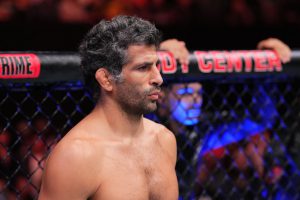In sumo wrestling, tradition and spirituality are everything. The referees and judges will wear official, traditional clothes. The arena will be blessed, the wrestlers will be blessed and each wrestler will have to take part in the ancient traditions of the sport. It’s all taken very seriously. It’s not just a fun day out for the audience, but it is part of a shared cultural experience that draws upon the religion and superstition of Japan.
Meanwhile in the old Lumpinee Muay Thai stadium in Bangkok, you’re neck deep in shouting gamblers waving bills, loud abrasive music wails and there is a profound smell of urine in the air. Two fighters kick each other and with each kick comes a loud yell of ‘Oi’ from the audience, informing the judges that the kick did indeed land.
On paper you couldn’t have two more polar opposite experiences if you tried… but then there is the Wai Kru Ram Muay, the traditional monkol and praijid. Muay Thai is an art and a sport that is still very connected to the spiritual beliefs of the Thai people.
Thailand is predominantly a Buddhist culture, but a religion alone doesn’t dictate the culture of a nation. Thailand is rich with folklore of malicious spirits, demons and monsters, and unlike more secular countries in the west, the people of Thailand still do legitimately believe in them.
Muay Thai is different from other martial arts that will emphasise mindfulness and spirituality as part of the arts values. Kung Fu goes hand in hand with ideals of strength, inner peace and balance, this comes from how far removed Kung Fu styles, and indeed many karate styles, are from actual combat. Spirituality makes up a larger chunk of learning these martial arts because they are fundamentally less about fighting, and more about preserving traditions, though those traditions may well be invented, more than they are historical.
Muay Thai exists in a nation where this spirituality is still alive and well, and for Thai people, Muay Thai is less about expressing those ideas, and more about just learning to fight. So, when Thai boxers do fight, the connections to spirituality come not from the martial art as a concept itself, but instead from Muay Thai as an extension of Thai culture.
Muay Thai is far more woven into the culture of Thailand, than Kung Fu or Karate are to their respective regions. Indeed, Muay Thai is in this respect, much more like sumo. They are the national sports and martial arts of their region. While the many styles of kung fu and karate were mainly practised by the wealthy middle class, Muay Thai was practised by the everyday villagers of Thailand, the poor, the impoverished.
Karate and Kung Fu are respected, for sure, but they are not a cornerstone of their nation’s cultural identity in the way that Muay Thai is. It might be interesting to a Japanese person that you study karate, but in Thailand, if you know Muay Thai, that means you’re a boxer. Children leave home to become boxers, grow up on camps and make their names fighting. When you see those boxers partaking in blessings, ritual dance and wearing traditional gear, it is not an appeal to tradition or history, but an earnest expression of a living culture that you are seeing.
Buddhist ideals, such as balance, find their way into the scoring of Muay Thai, a kick thrown with poor composure and balance will not score, even if it lands. It’s not enough to have landed, it needs to have been thrown well.
Whether all this is a good thing or not is of course subjective. After all, adhering to spiritual beliefs that stem from superstition, isn’t exactly a scientific or rational way to live a life. Especially when those said spirits cannot be proven to even exist. There is the argument that this spirituality encourages and fosters bigotry – while women are allowed to fight in Thailand, they must climb into the ring under the ropes, due to the belief that stepping over the ropes as a man would, will curse the ring and invite evil spirits to it. This is of course, sexism, justified by religious belief and it is fair to criticise it as that, but it does show how Muay Thai is intrinsically linked with the spirituality of Thailand, for both the good and the bad.
Muay Thai as a martial art, has no great opinions on ‘being like water’ or finding inner peace, it knows what it is, an effective fighting style. Yet it is perhaps the most spiritual of all martial arts, as it is an active part of the culture of Thailand. It isn’t a niche hobby, nor is it an attempt to revive lost tradition – it is simply part of Thailand’s national identity, that means it comes with spirituality, both good, and bad.
Muay thai boran, Muay boran, Martial arts philosophy, Muay thai
Black Belt Magazine
Bitcoin
Ethereum
Monero

Donate Bitcoin to The Bitstream
Scan the QR code or copy the address below into your wallet to send some Bitcoin to The Bitstream

Donate Ethereum to The Bitstream
Scan the QR code or copy the address below into your wallet to send some Ethereum to The Bitstream

Donate Monero to The Bitstream
Scan the QR code or copy the address below into your wallet to send some Monero to The Bitstream
Donate Via Wallets
Select a wallet to accept donation in ETH BNB BUSD etc..












